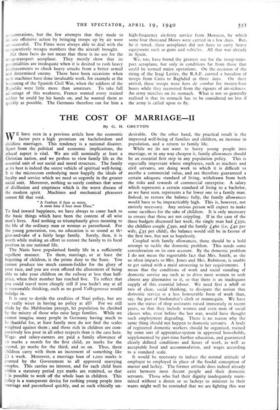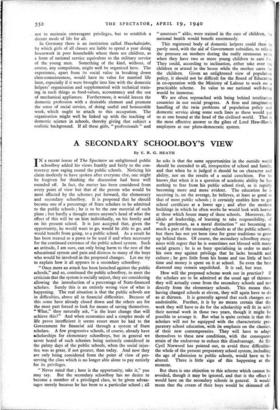THE COST OF MARRIAGE-II
By G. H. GRETTON
WE have seen in a previous article how the economic factor puts a high premium on bachelordom and childless marriages. This tendency is a national disaster. Apart from the political and economic implications, the ethical aspect is vital. We are still nominally at least a Christian nation, and we profess to view family life as the essential unit of our social and moral structure. The family at its best is indeed the surest vehicle of spiritual well-being. It is the microcosm embodying most happily the ideals of loyalty and service which we need so urgently in the greater social unit. Moreover, nothing so surely combats that sense of disillusion and emptiness which is the worst disease of the modern spirit. Machines and mechanical pleasures cannot fill that void.
" A ]'enfant it faut sa mere, A mon ame it faut mon Dieu."
To find inward happiness, we have always to come back to the basic things which have been the content of all wise men's lives. And nothing so triumphantly gives meaning to the life of the ordinary man or woman as parenthood. For the young generation, too, no education is so sound as tilt give-and-take of a fairly large family. Surely, then, it is worth while making an effort to restore the family to its focal position in our national life.
The Nazis have popularised family life in a sufficiently repellent manner. To them, marriage, or at least the begetting of children, is the prime duty to the State. You cannot produce too much cannon-fodder for the glory of your race, and you are even offered the allurement of being able to take your children on the railway at less than half- price, when their number has reached five. To reflect that you could travel more cheaply still if you hadn't any at all is treasonable thinking, such as no good Volksgenosse would indulge in.
It is easy to deride the crudities of Nazi policy, but are we really wiser in having no policy at all? For we still abide by the Malthusian precept, let population be checked by the misery of those who raise large families. While we cannot imagine many people in Germany having much to be thankful for, at least family men do not find the scales weighted against them ; and those rich in children are com- paratively less poor in all other respects than is the case here. Wage- and salary-earners are paid a family allowance of IO marks a month for the first child, 20 marks for the second, 3o marks for the third, and so on. Thus, three children carry with them an increment of something like Li a week. Moreover, a marriage loan of r,000 marks is granted by the Government to all approved marrying couples. This carries no interest, and for each child born within a statutory period 250 marks are remitted, so that 't is possible to work off the whole loan in children This policy is a transparent device for rushing young people into marriage and parenthood quickly, and as such ethically un- desirable. On the other hand, the practical result is the improved well-being of families and children, an increase in population, and a return to family life.
While we do not want to hurry young people into marriage, or in any way cheapen it, family allowances should be an essential first step in any population policy. This is especially important where employees, such as teachers and civil servants, are doing work to which it is difficult to ascribe a commercial value, and are therefore guaranteed a certain adequate standard of living, withdrawn from both the risks and rewards of commercial enterprise. A salary which represents a certain standard of living to a bachelor, as we have seen, represents a far lower one to a family man. Indeed, to restore the balance fully, the family allowances would have to be impracticably high. This is, however, not entirely necessary. Any serious person will expect to make some sacrifices for the sake of children. It is only necessary to ensure that these are not crippling. If in the case of the three budgets discussed last week, the single man had £350, the childless couple £390, and the family £460 (i.e, £40 per wife, £35 per child), the balance would still be in favour of the first two, but not so hopelessly.
Coupled with family allowances, there should be a bold attempt to tackle the domestic problem. This needs some consideration on its own account. By the domestic problem I do not mean the regrettable fact that Mrs. Smith, as she so often imparts to Mrs. Jones and Mrs. Robinson, is unable to get suited with a maid answering to her requirements. I mean that the conditions of work and social standing of domestic service are such as to drive most women to seek almost any alternative to it, so that there is an inadequate supply of this essential labour. We need first a whiff or two of clear, social thinking, to dissipate the notion that domestic service is a less honourable form of work than, say, the post of bookmaker's clerk or mannequin. We have seen the status of shop assistants raised immensely in recent years, so that they include women and even men of social classes who, even before the last war, would have thought such employment degrading. There is no reason why the same thing should not happen to domestic servants. A body of registered domestic workers should be organised, trained by some sort of apprentice-system in approved households, supplemented by part-time further education, and guaranteed clearly defined conditions and hours of work, as well as acceptable food and accommodation, and wages according to a standard scale.
It would be necessary to induce the normal attitude of employer to employed in place of the feudal conception of master and lackey. The former attitude does indeed already exist between most decent people and their domestic servants. Those who feel their dignity inadequately main- tained without a dozen or so lackeys to minister to their wants might well be reminded that we are fighting this war not to maintain extravagant privileges, but to establish a decent mode of life for all.
In Germany there is an institution called Haushaltsjahr, by which girls of all classes are liable to spend a year doing housework in poor households where there are children, as a form of national service equivalent to the military service of the young men. Something of the kind, without, of course, any compulsion, might well be organised here. The experience, apart from its social value in breaking down class-consciousness, would have its value for married life later, especially if it were brought into line with the domestic helpers' organisation and supplemented with technical train- ing in such things as food-values, accountancy and the use of mechanical appliances. Furthermore, it would leaven the domestic profession with a desirable element and promote the sense of social service, of doing useful and honourable work, which ought to attach to this occupation. The organisation might well be linked up with the teaching of domestic science in schools, thereby giving that subject a realistic background. If all these girls, " professionals " and " amateurs " alike, were trained in the care of children, 7.1e national health would benefit enormously.
This registered body of domestic helpers could then be partly used, with the aid of Government subsidies, to relieve the pressure on mothers during the really strenuous ye:rs when they have two or more young children to care for. They could, according to inclination, either take over the children or attend to the house while the mother cares ''or the children. Given an enlightened view of population policy, it should not be difficult for the Board of Education in co-operation with the Ministry of Labour to work our a practicable scheme. Its value to our national well-being would be immense.
We are often reproached with being behind totalitarian countries in our social progress. A firm and imaginative handling of the twin problems of population policy and domestic service along some such lines as these would put us at one bound at the head of the civilised world. That is the most effective answer to the gibes of Lord Haw-Haw's employers at our pluto-democratic system.











































 Previous page
Previous page